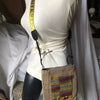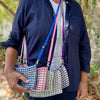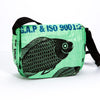Choosing Environmentally Conscious Fabrics: Your Essential Guide to the Top Seven Eco-friendly Fabrics

In the ongoing pursuit of sustainability, the focus has extended to our fabric choices. Yes, the clothes we wear and textiles we purchase can immensely contribute to environmental conservation. A myriad of fabrics is often advertised as sustainable, yet the actual eco-friendliness of some is debatable. In this article, we'll cut through the noise and explore seven fabrics that are genuinely environmentally friendly, including plant-based recycled cotton, organic linen, organic hemp, and TENCEL™ Lyocell; animal-derived recycled wool, and innovative fibres ECONYL® and Bananatex®.
Spotting Greenwashing and Choosing Truly Green Fabrics
One of the most essential aspects when selecting sustainable fabrics is knowing what to look for. The label isn't always a reliable indicator as some fabrics labeled as 'green' merely contribute to greenwashing. However, by understanding the impact of various material types and evaluating claims with solid evidence, we can make more environmentally sound decisions when it comes to fabric selection.
Organic, Recycled Cotton: A Greener Alternative
Cotton; light, breathable, and one of the most common fabrics worldwide. However, conventional cotton growing employs vast amounts of water and chemicals, negatively impacting both the environment and cotton growers. Organic cotton, meant to minimize environmental impact by eliminating harmful pesticides, has recently gained popularity as a seemingly greener alternative.
If you're after the most eco-friendly cotton, recycled cotton is your answer. Made from post-industrial and post-consumer cotton waste, recycled cotton can reduce water and energy consumption and help keep cotton clothes out of landfills.
Hemp: Versatile and Environmentally Friendly
Hemp, a widely used food, building material, cosmetic ingredient, and fabric, is grown globally. It's eco-friendly, needing minimal water and no pesticides, and it naturally fertilizes the soil it grows in. A very soft fabric that adjusts nicely with temperature variations, hemp makes for long-lasting pieces.
Linen: The Strength of the Flax Plant
Derived from the versatile flax plant, linen is another eco-friendly option. Needing little water and pesticides and growing even in poor-quality soil, linen is a durable fabric that's light and perfect for high temperatures.
TENCEL™ Lyocell: Cellulose Fabric Revolution
TENCEL™ Lyocell, a light cellulose fabric created by dissolving wood pulp, is gaining popularity for its sustainable qualities. It's 50% more absorbent than cotton, uses less energy and water to produce, and the chemicals used are managed in a closed-loop system, reducing waste.
Recycled Wool: Reducing Environmental and Ethical Impact
While traditional wool production has substantial environmental and ethical shortcomings, recycled wool significantly reduces these impacts. High in demand, this versatile material can easily blend with other materials and has excellent longevity, warmth, and comfort qualities.
ECONYL®: The Power of Recycled Materials
ECONYL®, a yarn created from recycled synthetic waste like industrial plastic, waste fabric, and fishing nets, offers high-quality material with minimal environmental impact. Its manufacture process uses less water and generates less waste compared to conventional nylon yarn.
Bananatex®: A Truly Circular Alternative
Bananatex® is an innovative fabric made purely from banana plants. Self-sufficient requiring no additional resources, this fabric is a genuinely circular alternative to synthetic fabrics, supporting reforestation and enhancing biodiversity and farmers' prosperity.
Why Make the Switch to Eco-friendly Fabrics?
Selecting textiles that have less harmful environmental impacts can make a significant difference. The evidence suggests that plant-based doesn't always equate to 'good', and synthetic doesn't necessarily mean 'bad'. However, specific innovative materials are substantiating their eco-friendly claims, providing us with tangible options for aligning our clothing choices with our environmental convictions.
Elevate Sustainability with Conscious Fabric Choices
The journey to sustainability transcends individual habits and influences sectors from agriculture to manufacturing and retail. By understanding how materials are sourced and the impact they have on the environment, we can make informed decisions that contribute to sustainability. Whether you are a fashion enthusiast or a clothes maker, your fabric choices can indeed make a difference. So next time you are shopping for a new outfit, make sure to keep these eco-friendly fabrics in mind. Our earth and future generations will thank you.
This article only scratches the surface of the myriad eco-friendly fabric options available today. To navigate this complex field, stay educated about what’s in your clothing, and continue seeking the most sustainable alternatives. Your choices matter and can make a significant difference in paving the way towards a sustainable global fashion industry. The quest for sustainability is ongoing, and even small victories, such as choosing recycled cotton over conventional, count towards a greener future.
-
Posted in
eco-conscious





